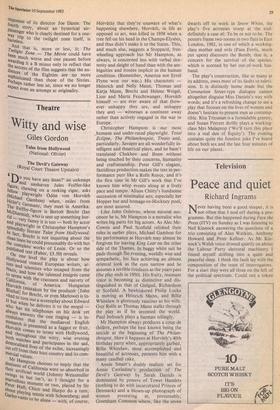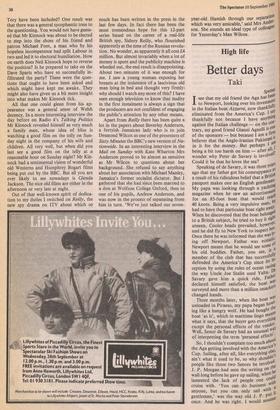Television
Peace and quiet
Richard Ingrams
Never having been a good sleeper, it is not often that I nod off during a pro- gramme. But this happened during Face the Press (ITV) on Sunday as I was listening to Neil Kinnock answering the questions of a trio consisting of Alan Watkins, Anthony Howard and Peter Kellner. As Mr Kin- nock's Welsh voice droned quietly on about the Labour Party electoral machinery I found myself drifting into a quiet and peaceful sleep. I think the fault lay with the composition of the team of interrogators. For a start they were all three on the left of the political spectrum. Could not a token
Tory have been included? One result was that there was a general sycophantic tone to the questioning. You would not have guess- ed that Mr Kinnock was about to be elected to step into the shoes of his friend and patron Michael Foot, a man who by his hopeless incompetence had split Labour in two and led it to electoral humiliation. How on earth does Neil Kinnock hope to reverse the position? Is he prepared to take on the Dave Sparts who have so successfully in- filitrated the party? These were the ques- tions that ought to have been asked and which might have kept me awake. They might also have given us a bit more insight into what makes Mr Kinnock tick.
All that one could glean from his ap- pearance was a general sense of Welsh decency. In a more interesting interview the day before on Radio 4's Talking Politics Mr Kinnock revealed himself as very much a family man, whose idea of bliss is watching a good film on the telly on Sun- day night in the company of his wife and children. All very well, but when did you last see a good film on the telly at a reasonable hour on Sunday night? Mr Kin- nock had a sentimental vision of wonderful old Westerns and Humphrey Bogart films being put out by the BBC. But all you are ever likely to see nowadays is Glenda Jackson. The nice old films are either in the afternoon or very late at night.
Out of that well-known spirit of dedica- tion to my duties I switched on Reilly, the new spy drama on ITV about which so much has been written in the press in the last few days. In fact there has been the most tremendous hype for this 12-part series based on the career of a real-life British spy, Sidney Reilly, who flourished apparently at the time of the Russian revolu- tion. No wonder, as apparently it all cost £4 million. But almost invariably when a lot of money is spent and the publicity machine is wheeled out, the end result is disappointing. About two minutes of it was enough for me. I saw a young woman exposing her breasts at the insistence of a lascivious old man lying in bed and thought very firmly: why should I watch any more of this? I have seen enough television to know that nudity in the first instalment is always a sign that the producers are not confident of engaging the public's attention by any other means.
Apart from Reilly there has been quite a lot in the papers about Beverley Anderson, a fortyish Jamaican lady who is to join Desmond Wilcox as one of the presenters of Sixty Minutes the BBC's new version of Na- tionwide. In an interesting interview in the Mail on Sunday with Kate Wharton Mrs Anderson proved to be almost as sensitive as Mr Wilcox to questions about her background. She refused to say anything about her association with Michael Manley, Jamaica's former socialist dictator. But I gathered that she had since been married to a don at Wolfson College Oxford, then to one of his pupils, Andrew Anderson, and was now in the process of separating from him in turn. 'We've just talked our seven- year-old Hamish through our separation which was very amicable,' said Mrs Ander' son. She sounds an ideal type of colleague for Yesterday's Man Wilcox.







































 Previous page
Previous page